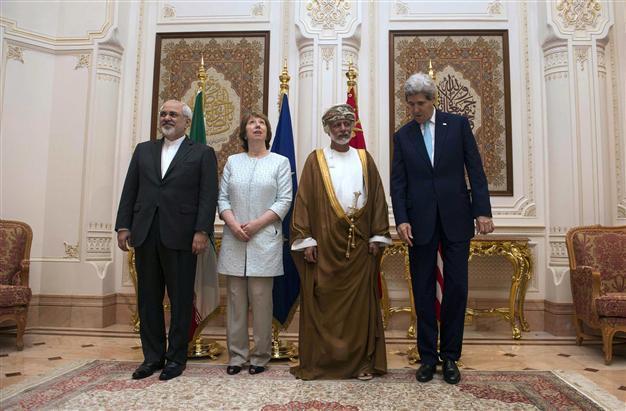Iran meets P5+1 as nuclear deal faces deadline
MUSCAT - Agence France-Presse

Iranian Foreign Minister Javad Zarif, EU envoy Catherine Ashton, Omani Foreign Minister Yussef bin Alawi and U.S. Secretary of State John Kerry pose for a photo in Muscat November 9, 2014. REUTERS Photo
Iran and world powers met in Muscat Nov. 11 amid growing signs that a long-bargained deal on Tehran's nuclear programme will not be struck by a November 24 deadline.
The one-day meeting comes after lengthy discussions between US Secretary of State John Kerry and Iran's Foreign Minister Mohammad Javad Zarif broke off in the Gulf sultanate late Monday with no signs of progress.
Tuesday's meeting between Iran's nuclear negotiating team and officials from the P5+1 -- -- the United States, France, Britain, Russia and China, plus Germany -- started around 11:45 am (0745 GMT).
The discussions, chaired by former EU foreign policy chief Catherine Ashton, were scheduled to brief the P5+1 members on Kerry and Zarif's talks, but Iranian and US officials indicated Monday that big obstacles stand in the way of a final agreement.
The West still appears unconvinced of Iran's reassurances that it has not sought and will not attempt to develop an atomic bomb, while Tehran wants greater assurances on when sanctions will be lifted, as well as fewer curbs on its nuclear activities.
The US State Department said the head-to-head meetings -- more than 10 hours across two days -- proved "tough, direct and serious", adding that "there is still time" for progress.
Iran's deputy foreign minister Abbas Araqchi, quoted by state media, was more candid.
"To reach a result by November 24 is very difficult but we do not despair," he said.
A US official said Kerry's top two negotiators, Under Secretary of State Wendy Sherman and Bill Burns, a former under secretary, would attend the P5+1 briefing which will also include technical experts on nuclear policy and sanctions.
Kerry, now in Beijing, will speak to President Barack Obama as well as White House national security adviser Susan Rice about the talks with Zarif.
In Muscat, the Iranian delegation also held bilateral talks with Russia and China, with similar discussions with Britain, France and Germany scheduled for later in the day.
The P5+1 wants Iran to reduce the scope of its atomic activities. In exchange, the West is offering to ease punishing economic sanctions imposed since 2012 which have hobbled Iran's economy.
Iran says its nuclear programme aims to produce atomic energy to reduce the country's reliance on fossil fuels, requiring a massive increase in its ability to enrich uranium in coming years.
The Iranian delegation is under pressure to deliver a quick and total lifting of US, UN and European sanctions under a final deal. Obama, however, said in a television interview on Sunday that sanctions would only be "slowly reduced" if Tehran meets its obligations.
The key sticking points are thought to be the number and type of uranium-enriching centrifuges Iran should be allowed to keep spinning, the process for relieving sanctions and the duration of the final deal. Iran has said five years but world powers have suggested at least double that.
With no signs of a final deal being near, there are expectations that the interim deal implemented in January will have to be extended. The has already happened once -- when a July 20 deadline was missed. Despite the logjam, neither side has indicated it would walk away from the table.
The meetings in Muscat follow the revelation that Obama reportedly wrote to Iran's supreme leader Ayatollah Ali Khamenei to push for a deal, arguing the Islamic republic and the West have shared regional interests.
This apparent reference to the fight against Islamic State group militants in Syria and Iraq was played down by Kerry, with the US diplomat saying "there is no linkage whatsoever" with the nuclear talks.
Zarif and President Hassan Rouhani are under fire from lawmakers sceptical of the interim deal who have said a bigger, final agreement must be ratified by parliament.
